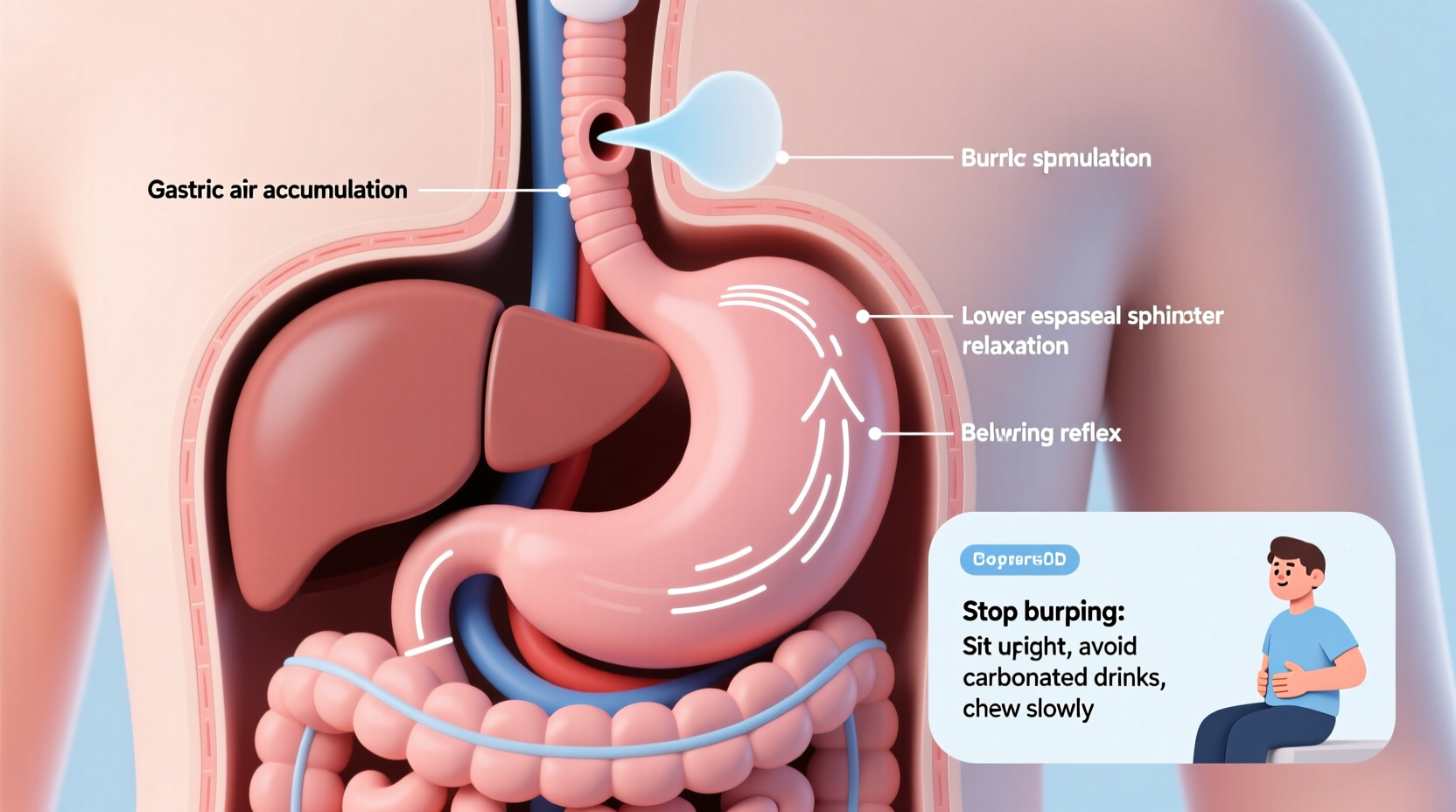Burping is a normal bodily function that helps release excess air from the digestive tract. However, when it occurs frequently—even when your stomach is empty—it can be uncomfortable, socially awkward, or a sign of an underlying issue. Many people are surprised to learn that burping without having eaten recently is not uncommon and often linked to habits, digestive sensitivity, or gastrointestinal conditions. Understanding the root causes and knowing how to manage them can significantly improve comfort and quality of life.
Why Burping Happens on an Empty Stomach

Burping, or belching, is the body’s way of expelling air that has accumulated in the upper digestive tract. While most associate it with eating or drinking, air can enter the esophagus at any time. When the stomach is empty, this trapped air still needs to escape, leading to burps even without food consumption.
The primary source of this air is swallowing—known as aerophagia. This can happen unconsciously during activities like talking while working, chewing gum, smoking, or even breathing rapidly due to anxiety. Once swallowed, the air travels into the esophagus and then the stomach. If no food is present to absorb or mix with the gas, it rises quickly and triggers a burp.
In some cases, chronic burping on an empty stomach may reflect hypersensitive gut reflexes or conditions such as gastroesophageal reflux disease (GERD), functional dyspepsia, or small intestinal bacterial overgrowth (SIBO). These disorders can amplify normal digestive processes, making minor gas buildup feel more urgent and noticeable.
Common Causes of Empty-Stomach Burping
- Aerophagia (air swallowing): Often occurs during rapid speech, gum chewing, carbonated drinks, or using straws.
- Anxiety and stress: Can lead to hyperventilation or unconscious air swallowing.
- GERD or acid reflux: Stomach acid irritates the esophagus, triggering protective burping reflexes.
- Dietary habits: Even without eating, sipping water or herbal tea may introduce air if done quickly.
- Hiatal hernia: A condition where part of the stomach pushes into the chest, affecting pressure and gas movement.
- Gut microbiome imbalances: Bacteria in the gut can produce excess gas, which may trigger burping.
“Patients often don’t realize they’re swallowing air throughout the day. It’s not just about food—it’s about behavior, breathing, and even posture.” — Dr. Lena Torres, Gastroenterologist
How to Stop Burping on an Empty Stomach: Practical Strategies
Reducing unwanted burping starts with identifying and modifying the behaviors and conditions contributing to it. The following step-by-step approach combines lifestyle adjustments, dietary awareness, and medical insight for long-term relief.
Step-by-Step Guide to Reduce Empty-Stomach Burping
- Monitor and modify breathing patterns. Practice diaphragmatic breathing to reduce shallow, rapid breaths that pull in excess air.
- Eliminate gum chewing and hard candy sucking. These stimulate saliva production and encourage air swallowing.
- Avoid carbonated beverages—even in small amounts. Seltzer, soda, or sparkling water release CO₂ directly into the stomach.
- Eat and drink slowly. Even when consuming liquids on an empty stomach, sip rather than gulp.
- Reduce or quit smoking. Inhaling smoke introduces air and irritates the digestive lining.
- Manage stress through mindfulness or therapy. Anxiety-related burping often improves with cognitive behavioral techniques.
- Elevate your head while sleeping. This reduces nighttime reflux episodes that trigger morning burping.
Lifestyle Checklist to Minimize Unwanted Burping
- ✔ Avoid chewing gum today
- ✔ Drink only non-carbonated beverages
- ✔ Eat meals slowly; chew each bite 20–30 times
- ✔ Practice 5 minutes of deep breathing
- ✔ Avoid lying down within 2 hours of eating
- ✔ Keep a log of burping episodes and potential triggers
When to Suspect a Medical Condition
Occasional burping is normal. However, frequent or forceful burping on an empty stomach—especially when accompanied by other symptoms—may indicate an underlying health issue. Consider consulting a healthcare provider if you experience:
- Persistent bloating or abdominal pain
- Heartburn or regurgitation
- Unintentional weight loss
- Nausea or early satiety (feeling full quickly)
- Burping multiple times per hour without eating
Diagnostic tools such as upper endoscopy, pH monitoring, or breath tests for SIBO may be recommended. Treating conditions like GERD with proton pump inhibitors (PPIs) or addressing gut motility issues can dramatically reduce excessive burping.
| Cause | Symptoms | Action Step |
|---|---|---|
| Aerophagia | Frequent burping, bloating, no heartburn | Slow down speaking/eating, avoid straws |
| GERD | Burning chest pain, sour taste, nighttime cough | Limit acidic foods, elevate bed, see doctor |
| Functional Dyspepsia | Upper abdominal discomfort, early fullness | Track diet, consider H. pylori test |
| SIBO | Bloating after meals, diarrhea/constipation | Breath testing, antibiotic treatment |
Real-Life Example: Managing Chronic Burping at Work
Sarah, a 34-year-old project manager, noticed she was burping frequently during meetings—even before lunch. She rarely felt hungry but would involuntarily let out quiet burps every few minutes, causing embarrassment. After tracking her habits, she realized she chewed gum constantly to stay alert and often drank sparkling water from her desk bottle. She also tended to speak quickly under stress.
With guidance from her doctor, Sarah eliminated gum and switched to still water. She practiced paced breathing before high-pressure calls and reduced caffeine intake. Within three weeks, her burping decreased by over 80%. A follow-up discussion revealed mild GERD, managed with occasional antacids and posture changes. Sarah now uses a notebook to monitor digestive signals and reports feeling more in control—and confident—than ever.
Frequently Asked Questions
Can anxiety really cause burping when I haven't eaten?
Yes. Anxiety increases muscle tension and alters breathing patterns, often leading to subconscious air swallowing. This air accumulates and results in frequent burping, even on an empty stomach. Mindfulness practices and controlled breathing can help break this cycle.
Is it harmful to burp frequently throughout the day?
While occasional burping is harmless, constant burping may disrupt daily life or signal digestive dysfunction. If it interferes with work, social interactions, or sleep, it’s worth investigating potential causes with a healthcare provider.
Are there foods I should avoid even if I'm not eating them on an empty stomach?
Certain foods promote gas production or relaxation of the lower esophageal sphincter, increasing burping risk later. Common culprits include onions, garlic, fried foods, chocolate, mint, and alcohol. Limiting these—even during meals—can reduce overall gas buildup and reflexive burping.
Final Thoughts and Next Steps
Burping on an empty stomach is more common than many realize, but it’s not something you have to live with indefinitely. By understanding the mechanisms behind it—whether behavioral, psychological, or physiological—you gain the power to make meaningful changes. Simple adjustments like slowing your breathing, eliminating carbonated drinks, and managing stress can yield significant improvements.
If lifestyle changes don’t bring relief, don’t hesitate to seek medical evaluation. Conditions like GERD, hiatal hernia, or SIBO are treatable, and early intervention prevents complications. Your digestive comfort matters.









 浙公网安备
33010002000092号
浙公网安备
33010002000092号 浙B2-20120091-4
浙B2-20120091-4
Comments
No comments yet. Why don't you start the discussion?